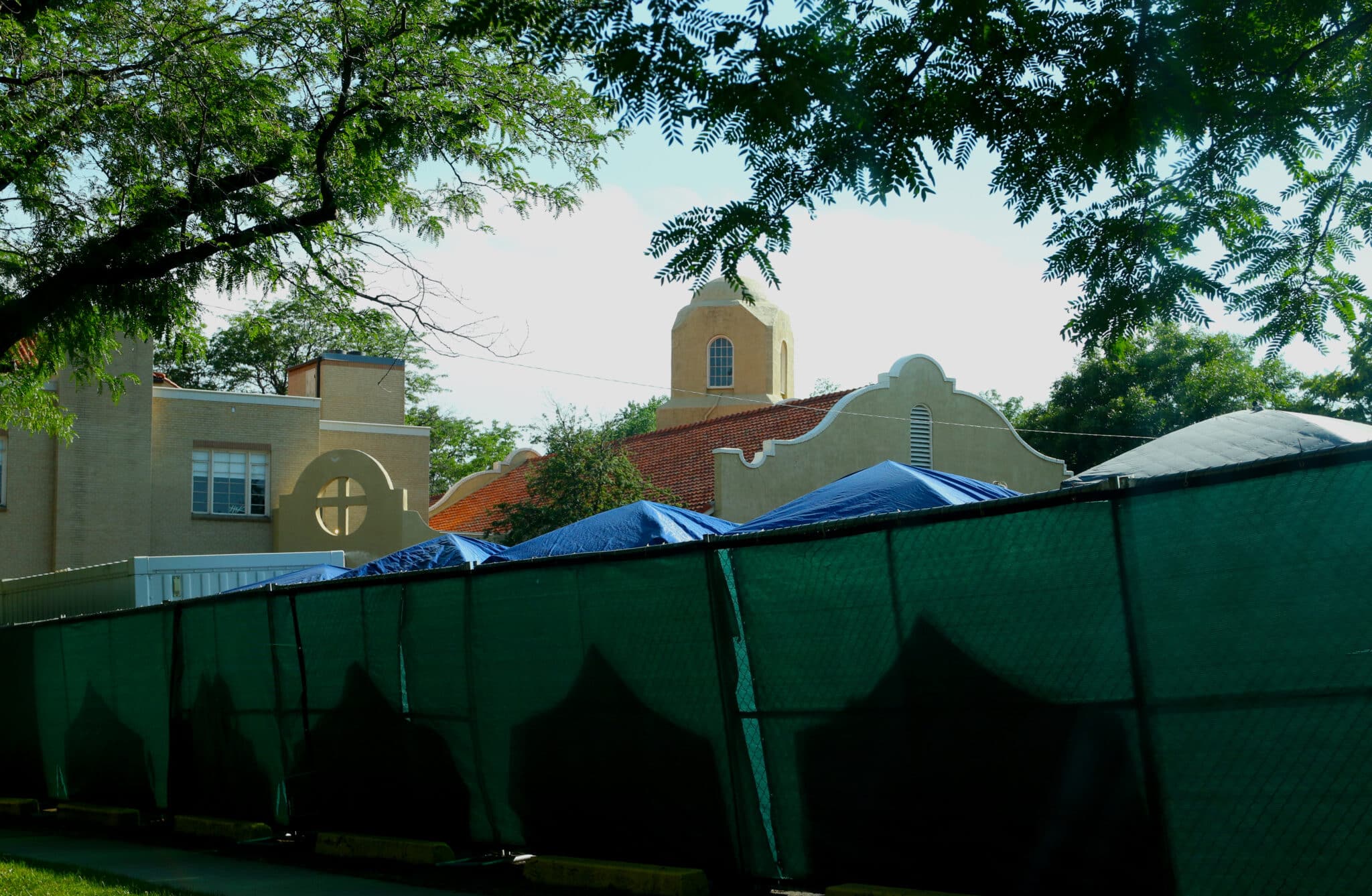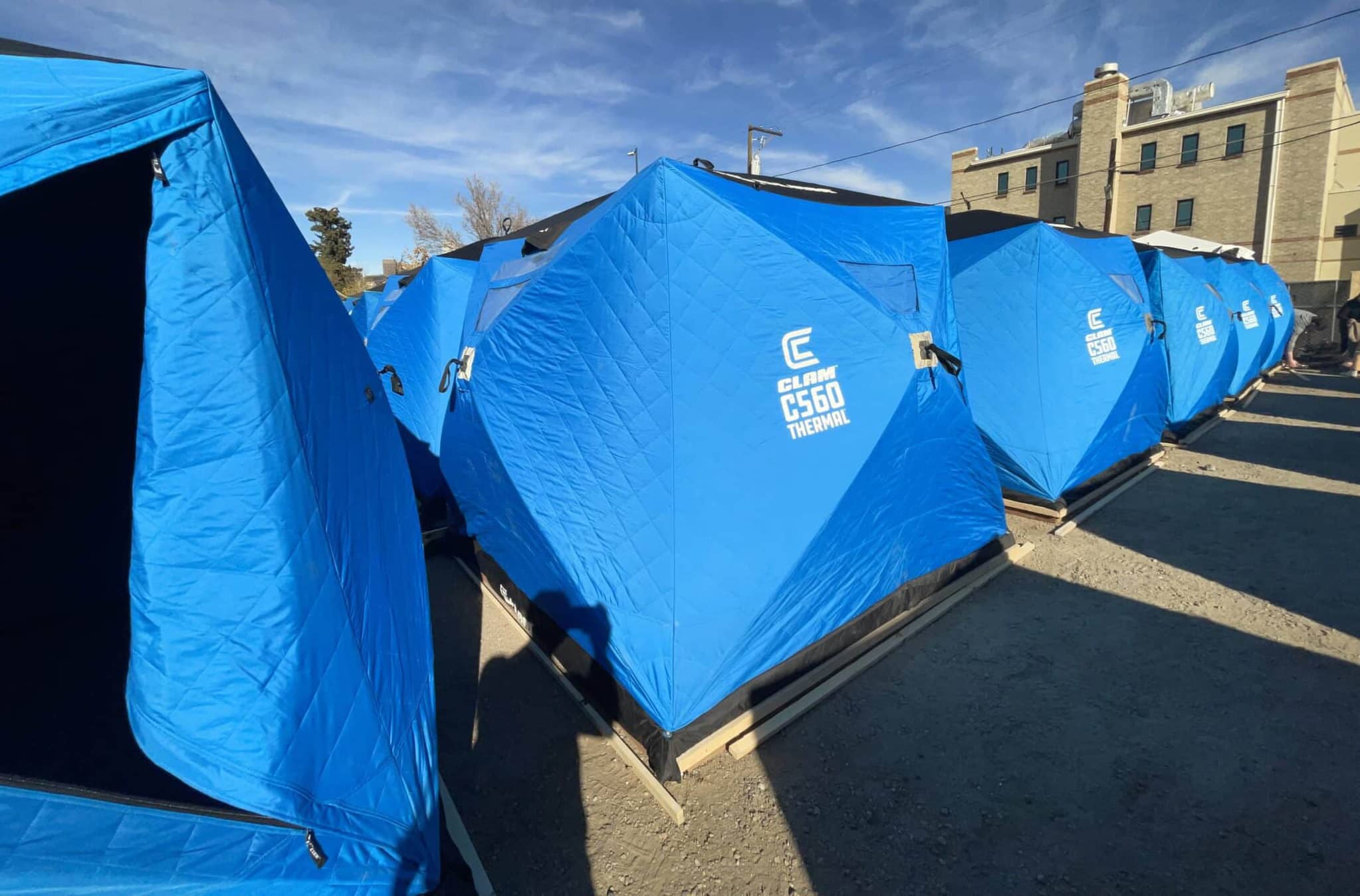
The city-sanctioned homeless campsite at Park Hill United Methodist Church sparked a lawsuit. It closed in December, long before the judge’s ruling was made. (BusinessDen file photos)
A Denver judge has declined to put an end to the city’s sanctioned homeless camps, rejecting a lawsuit out of Park Hill that claimed the city overstepped its authority in allowing them.
Denver District Court Judge Alex Myers ruled Thursday that a city zoning administrator and zoning board were within their authority to approve permits for the sites, which the city has supported by providing land and millions of dollars of taxpayer funds.
“This ruling affirms our efforts to provide safe, stable, healthy and dignified solutions for our unhoused neighbors,” said Assistant City Attorney Josh Roberts. “The city is pleased that the court has resolved the matter in a manner that upholds the administrative process.”
In 2020, Denver Zoning Administrator Tina Axelrad ruled that so-called “safe outdoor spaces” would be allowed, temporarily, in some parts of the city. The next year, the Colorado Village Collaborative, a nonprofit that combats homelessness, received a six-month permit to operate one outside Park Hill United Methodist Church at 2045 Glencoe St.
Several groups appealed the zoning administrator’s broader ruling, as well as the Park Hill permit specifically, to an appeals board, which narrowly upheld both decisions during two votes in the summer of 2021. So, opponents of the campsites sued.
The opponents, calling themselves Denver Deserves Better, were represented by attorney Daniel Burrows, legal director of the conservative group Advance Colorado. Burrows and Advance Colorado did not respond to requests for comment.
The plaintiffs alleged that Axelrad, as an unelected bureaucrat, abused her power by allowing the campsites to operate over the objections of some neighbors. They asked Myers to prohibit the campsites.
The Park Hill campsite closed last December and its permit expired on New Year’s Eve. That same month, the Colorado Village Collaborative and other defendants asked Myers to dismiss Denver Deserves Better’s lawsuit, calling it moot since the camp had closed.
Denver Deserves Better responded that while the Park Hill matter may be moot, the larger question was still relevant: whether zoning administrators can allow sanctioned homeless encampments over the objections of some neighbors.
The case sat idle between January and last Thursday, when Myers ruled. The judge determined that Axelrad and the zoning appeals board did not overstep in allowing the campsites and that their decisions rightly followed city zoning procedures.

A homeless campsite at the corner of 8th Avenue and Elati Street in Lincoln Park was also appealed to Denver’s Board of Adjustment for Zoning, which rejected the appeal.
Myers declined to rule on the Park Hill permit specifically, since it is moot.
“We’re grateful that the court reaffirmed the Board of Adjustment’s permit decision allowing the safe outdoor space program to continue to provide lifesaving services for our unsheltered neighbors in Denver,” said Colorado Village Collaborative spokeswoman Jennifer Forker.
Sanctioned campsites have been at eight different locations in Denver since the first opened in late 2020. All but one has been managed at least in part by CVC.
The camps, which are fenced in and staffed around the clock, generally operate at a single location for between six months and a year, and multiple camps operate at one time. Individuals sleep in ice-fishing tents installed on platforms.
There are currently three: On city-owned property at 3815 Steele St. in the Clayton neighborhood; outside the city-owned Arie P. Taylor building at 4685 Peoria St. in Montbello; and 221 Federal Blvd. in Barnum, on land owned by the St. Francis Center.
“We’re proud that so far this year the program has provided more than 40,000 nights of safe, dignified shelter and helped nearly 90 people access more stable housing,” Forker said.
In February, the Denver City Council approved a $3.9 million contract with CVC to operate campsites. That was on top of $900,000 which was approved in February 2021.
The Hancock administration’s proposed 2023 budget calls for $7.8 million in campsite spending.
The Park Hill campsite wasn’t the only location to meet resistance from some neighbors. A campsite at the corner of 8th Avenue and Elati Street in Lincoln Park was also appealed to Denver’s Board of Adjustment for Zoning, which rejected the appeal in April.

The city-sanctioned homeless campsite at Park Hill United Methodist Church sparked a lawsuit. It closed in December, long before the judge’s ruling was made. (BusinessDen file photos)
A Denver judge has declined to put an end to the city’s sanctioned homeless camps, rejecting a lawsuit out of Park Hill that claimed the city overstepped its authority in allowing them.
Denver District Court Judge Alex Myers ruled Thursday that a city zoning administrator and zoning board were within their authority to approve permits for the sites, which the city has supported by providing land and millions of dollars of taxpayer funds.
“This ruling affirms our efforts to provide safe, stable, healthy and dignified solutions for our unhoused neighbors,” said Assistant City Attorney Josh Roberts. “The city is pleased that the court has resolved the matter in a manner that upholds the administrative process.”
In 2020, Denver Zoning Administrator Tina Axelrad ruled that so-called “safe outdoor spaces” would be allowed, temporarily, in some parts of the city. The next year, the Colorado Village Collaborative, a nonprofit that combats homelessness, received a six-month permit to operate one outside Park Hill United Methodist Church at 2045 Glencoe St.
Several groups appealed the zoning administrator’s broader ruling, as well as the Park Hill permit specifically, to an appeals board, which narrowly upheld both decisions during two votes in the summer of 2021. So, opponents of the campsites sued.
The opponents, calling themselves Denver Deserves Better, were represented by attorney Daniel Burrows, legal director of the conservative group Advance Colorado. Burrows and Advance Colorado did not respond to requests for comment.
The plaintiffs alleged that Axelrad, as an unelected bureaucrat, abused her power by allowing the campsites to operate over the objections of some neighbors. They asked Myers to prohibit the campsites.
The Park Hill campsite closed last December and its permit expired on New Year’s Eve. That same month, the Colorado Village Collaborative and other defendants asked Myers to dismiss Denver Deserves Better’s lawsuit, calling it moot since the camp had closed.
Denver Deserves Better responded that while the Park Hill matter may be moot, the larger question was still relevant: whether zoning administrators can allow sanctioned homeless encampments over the objections of some neighbors.
The case sat idle between January and last Thursday, when Myers ruled. The judge determined that Axelrad and the zoning appeals board did not overstep in allowing the campsites and that their decisions rightly followed city zoning procedures.

A homeless campsite at the corner of 8th Avenue and Elati Street in Lincoln Park was also appealed to Denver’s Board of Adjustment for Zoning, which rejected the appeal.
Myers declined to rule on the Park Hill permit specifically, since it is moot.
“We’re grateful that the court reaffirmed the Board of Adjustment’s permit decision allowing the safe outdoor space program to continue to provide lifesaving services for our unsheltered neighbors in Denver,” said Colorado Village Collaborative spokeswoman Jennifer Forker.
Sanctioned campsites have been at eight different locations in Denver since the first opened in late 2020. All but one has been managed at least in part by CVC.
The camps, which are fenced in and staffed around the clock, generally operate at a single location for between six months and a year, and multiple camps operate at one time. Individuals sleep in ice-fishing tents installed on platforms.
There are currently three: On city-owned property at 3815 Steele St. in the Clayton neighborhood; outside the city-owned Arie P. Taylor building at 4685 Peoria St. in Montbello; and 221 Federal Blvd. in Barnum, on land owned by the St. Francis Center.
“We’re proud that so far this year the program has provided more than 40,000 nights of safe, dignified shelter and helped nearly 90 people access more stable housing,” Forker said.
In February, the Denver City Council approved a $3.9 million contract with CVC to operate campsites. That was on top of $900,000 which was approved in February 2021.
The Hancock administration’s proposed 2023 budget calls for $7.8 million in campsite spending.
The Park Hill campsite wasn’t the only location to meet resistance from some neighbors. A campsite at the corner of 8th Avenue and Elati Street in Lincoln Park was also appealed to Denver’s Board of Adjustment for Zoning, which rejected the appeal in April.
